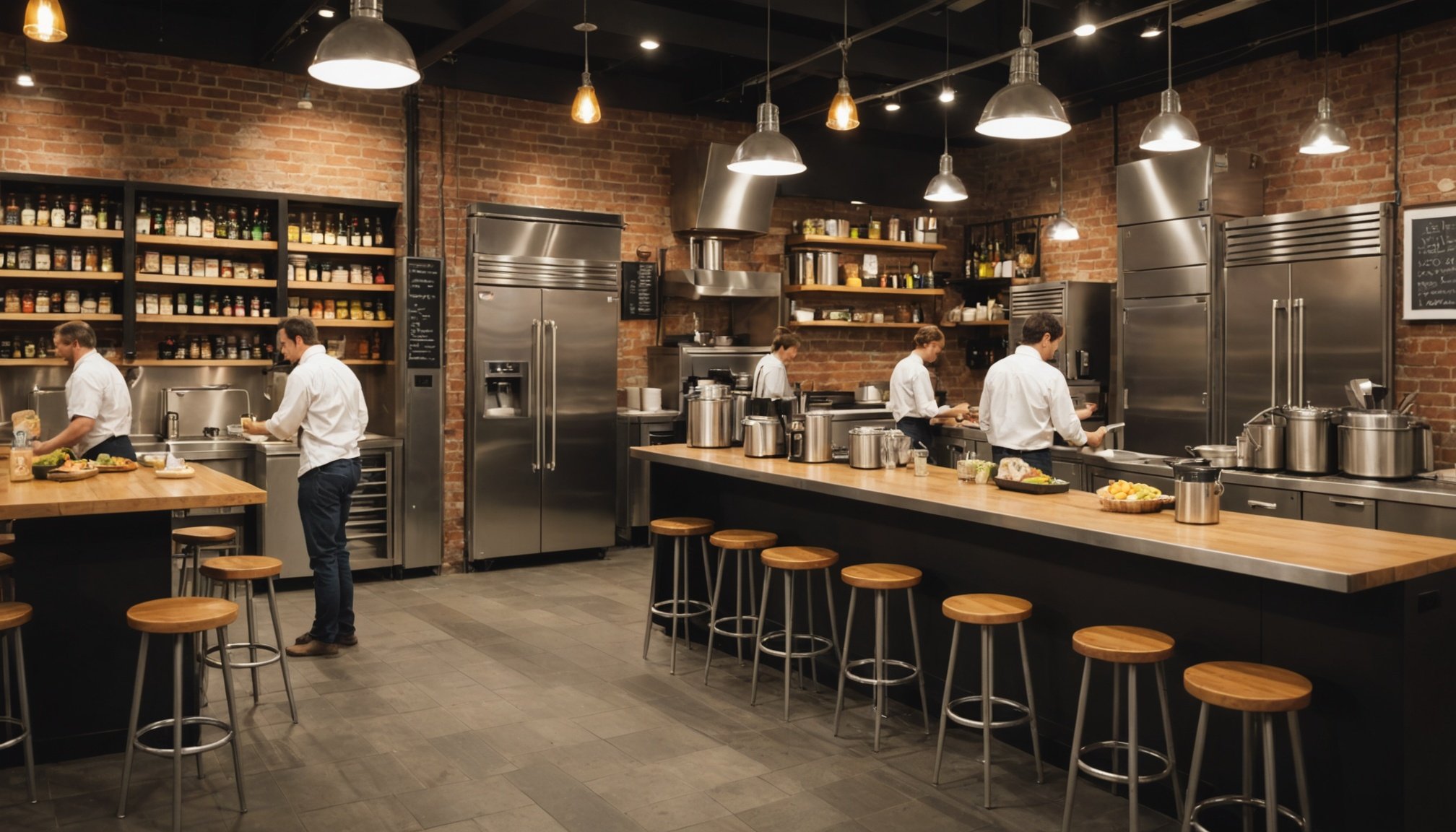Understanding Zero-Waste Practices in Restaurants
A zero-waste strategy in restaurants focuses on minimising waste through efficient resource management. By integrating eco-friendly practices, restaurants can significantly reduce their environmental footprint. At its core, a zero-waste approach involves evaluating all operations to limit landfill waste. This includes tactics like composting, recycling, and investing in reusable materials.
The importance of adopting sustainability in restaurants extends beyond environmental impacts. Embracing zero-waste practices enhances a restaurant’s brand reputation and aligns with growing consumer preferences for eco-friendly dining experiences. Diners today are more conscious of their environmental impact and favour establishments that reflect their values.
Also to discover : Discover the Benefits of Adding Organic Ingredients to Your Restaurant Menu
Current trends indicate a rise in demand for eco-friendly practices. Restaurants are responding by innovating their operations, such as sourcing local, sustainable ingredients and minimising energy use. Many are using technology to track waste, ensuring that sustainability efforts are measurable and effective. Restaurants embracing these practices not only contribute to environmental health but can also attract and retain a conscientious clientele, boosting long-term success.
Innovative Tactics for Reducing Food Waste
To tackle excessive food waste, restaurants are embracing various food waste reduction techniques. One effective approach is implementing inventory management systems. These systems allow for precise tracking of ingredients, reducing over-purchasing and spoilage.
Also to discover : Creating the Ultimate Child-Friendly Menu: Best Tactics to Thrill Kids and Satisfy Parents
Implementing Inventory Management Systems
An effective inventory management system ensures accurate tracking of stock levels. This method helps in minimising excess and maximising resource use efficiently. Restaurants can adjust orders based on current inventory, preventing unnecessary waste accumulation.
Utilizing Imperfect Produce
Creative use of ingredients includes utilizing imperfect produce in menu offerings. By incorporating these fruits and vegetables, restaurants can reduce waste significantly while offering unique dishes. Imperfect produce, often discarded due to aesthetic flaws, can still provide excellent flavour and nutritional value.
Developing Menu Items Around Leftovers
Designing menus that integrate surplus items aids in waste reduction. By developing dishes around leftovers, chefs can creatively utilise unused ingredients, promoting sustainable dining options. This approach not only addresses food waste but also introduces guests to innovative culinary experiences.
By adopting these tactics, restaurants can effectively manage food waste, contribute to sustainability, and enhance their eco-friendly reputation.
Enhancing Composting and Recycling Efforts
Incorporating composting in restaurants presents a sustainable approach to waste management. Establishing an effective composting system involves selecting appropriate compost bins and ensuring proper segregation of organic waste. This reduces landfill stress and enriches soil when used agriculturally. Implementing recycling systems further enhances waste management. Restaurants must educate staff on correct separation methods, targeting materials such as plastics, paper, and metals. Clear recycling systems are pivotal for maximising efficiency.
Proper disposal methods are integral to sustainable practices. Identifying waste streams and establishing procedures for each ensures compliance with environmental standards. Beyond internal processes, community partnerships fortify these initiatives. Collaborating with local waste management firms or community groups can improve recycling efforts, offering solutions tailored to specific needs. Engaging in such partnerships amplifies environmental impact and demonstrates corporate social responsibility.
Participation in local community partnerships for recycling initiatives enables restaurants to contribute to broader environmental goals. These partnerships can provide mutual benefits, such as shared knowledge and resources to improve sustainability practices. Emphasising both composting and recycling aligns with consumer expectations for eco-friendly dining experiences and positions restaurants as leaders in environmental health. By championing these efforts, restaurants gain reputation and attract patrons committed to sustainability.
Training Staff on Zero-Waste Initiatives
Effective implementation of zero-waste practices in restaurants requires comprehensive staff training programs. Creating tailored training modules is essential, as they offer detailed guidance on sustainability practices. These modules should cover waste segregation, minimising resource use, and proper recycling techniques.
Employee engagement plays a crucial role in achieving zero-waste goals. Motivating and involving staff can be accomplished through incentive programs, workshops, and open discussions. By fostering an environment where employees can openly share ideas, management can promote a team-oriented approach to sustainability.
Encouraging feedback and suggestions from staff helps refine zero-waste strategies. Employees, being actively involved in daily operations, often have valuable insights into efficiency improvements. Establishing a system where feedback is regularly sought and valued drives a culture of continuous improvement and innovation in waste management.
Training staff not only enhances operational efficiency but also aligns the entire team with the restaurant’s sustainability goals. This collective effort ensures that every aspect of the establishment’s operations is optimised for zero waste, ultimately leading to a more sustainable and successful restaurant model.
Leveraging Technology for Efficiency
In the quest to achieve sustainability, restaurants are increasingly turning to restaurant management software. These tech solutions assist with waste tracking by providing detailed analytics on usage patterns and inventory levels. By using data analytics, establishments can precisely identify waste patterns, allowing them to refine processes and make informed decisions to minimise waste output.
Automated systems play a significant role in promoting efficiency within restaurant operations. Through automation, tasks such as order tracking, stock level monitoring, and waste disposal can be streamlined, enabling staff to focus on core activities like customer service and food quality. This not only improves operational flow but also aligns with zero-waste goals by promoting measured resource use and reducing human error.
Innovative technology solutions, such as smart bins equipped with sensors that monitor waste levels, are supporting restaurants in their zero-waste initiatives. These bins alert staff when it’s time to dispose of waste, thereby reducing unnecessary trips and ensuring timely waste management. By adopting these tech-savvy approaches, restaurants can enhance their sustainability credentials, appeal to eco-conscious diners, and ultimately contribute to a healthier planet. Embracing technology for efficiency is not just practical; it’s essential for any modern restaurant committed to zero-waste practices.
Case Studies of Successful Zero-Waste Restaurants
Examining successful restaurants that have implemented zero-waste practices provides valuable insights into practical strategies. These establishments often begin by auditing their waste to identify key areas for reduction. One prominent example is Nolla in Helsinki, which utilises closed-loop systems to repurpose waste into essential resources. By focusing on reusable packaging and composting, Nolla has dramatically decreased its landfill contributions.
Another remarkable case is Melbourne’s Silo, a pioneer in the zero-waste movement. By collaborating with local suppliers, Silo ensures that all ingredients arrive without unnecessary packaging, promoting a sustainable supply chain. Their innovative approach includes creating dishes from surplus produce, furthering waste reduction and celebrating creative ingredient use.
Restaurants like these showcase measurable benefits, such as reduced operating costs, enhanced brand reputation, and increased customer loyalty. They demonstrate how strategic planning and creative problem-solving can transform sustainability goals into reality. By spotlighting these success stories, other eateries are inspired to embrace zero-waste initiatives, realising both environmental advantages and economic gains. The commitment of these restaurants sets a precedent for eco-friendly innovation within the industry.
Cost-Effectiveness and Long-Term Benefits of Zero-Waste Practices
Embracing zero-waste practices offers notable financial advantages for restaurants. Though initial investments in sustainable methods and materials may seem daunting, the long-term financial savings prove substantial. For instance, by cutting back on waste disposal fees and optimizing resource usage, restaurants can significantly reduce operational costs over time.
Analyzing Operational Costs
A thorough analysis of operational costs reveals the economic efficiency of zero-waste strategies. While initial expenses might include composting and recycling setups, the reduction in wasted resources leads to measurable savings. Optimizing sustainable business practices, such as reducing excess inventory and avoiding over-purchasing, does not only minimize waste but also reallocates funds to other critical areas like quality ingredients.
Long-Term Profitability through Sustainability
The pursuit of sustainability bolsters long-term profitability. Implementing eco-friendly dining methods can enhance a restaurant’s image, contributing to increased ROI in sustainability. Patrons appreciate establishments aligning with environmental values, leading to consistent customer loyalty and repeat business.
Attracting Eco-Conscious Customers
Eco-friendly practices draw a burgeoning demographic of environmentally conscious diners. Marketing strategies that highlight a restaurant’s commitment to sustainability can amplify its appeal. By tapping into this conscientious market, restaurants not only boost their brand but also sustain a loyal customer base invested in ethical dining.
Resources and Tools for Implementation
To effectively implement a zero-waste strategy, restaurants can utilise various resources and tools. These facilitate the adoption of sustainability in restaurants and support the burgeoning interest in eco-friendly practices.
Zero-Waste Resources and Educational Materials
Educational materials are pivotal in understanding and adopting zero-waste models. Restaurants can benefit from access to case studies and guides detailing successful strategies. These resources showcase practical implementations and highlight the benefits of zero-waste practices.
Implementation Tools
Numerous technologies aid in simplifying waste reduction efforts. Restaurant management software and automated systems help streamline operations, offering real-time data on waste levels. These tools empower restaurants to make informed decisions, enhancing efficiency and reducing environmental impact.
Training and Support
Comprehensive training resources are available to support staff in new roles within zero-waste initiatives. Workshops and online courses provide foundational knowledge and continuous learning opportunities. Engaging zero-waste training modules ensures staff are well-equipped to contribute effectively.
Utilising these resources and tools bolsters a restaurant’s capability to implement and maintain sustainability effectively. By educating staff and leveraging technology, restaurants can further align their operations with environmental values and consumer expectations.










